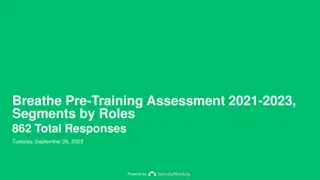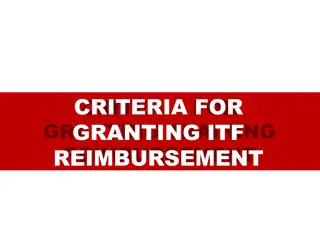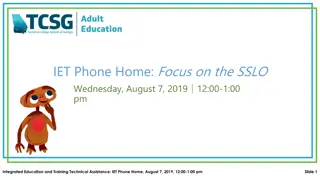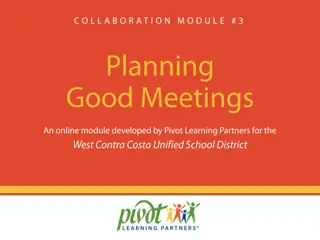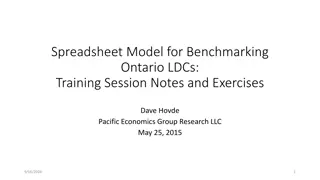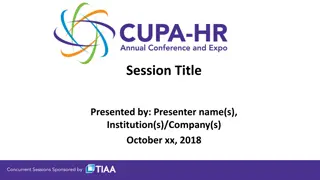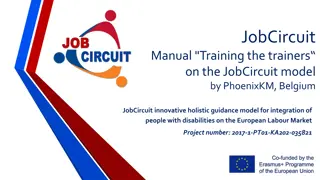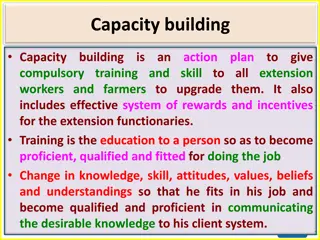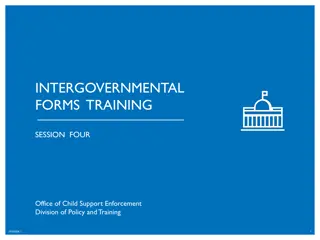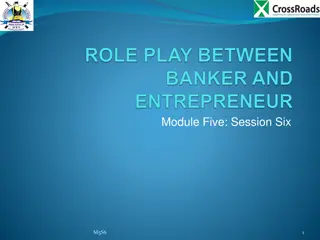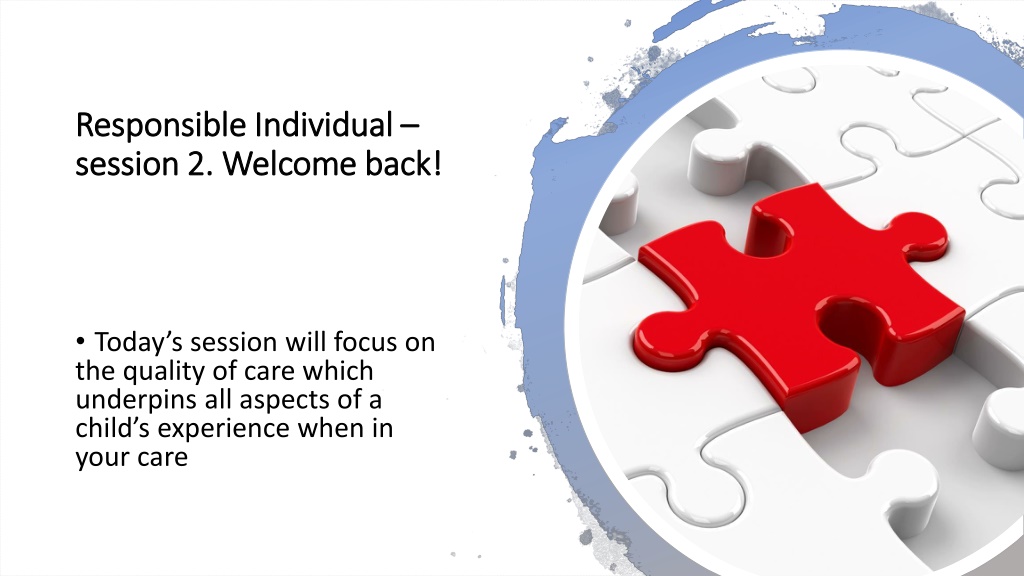
Quality of Care in Childcare Services
Ensuring the quality of care is essential in childcare services to create a nurturing environment for children. The Responsible Individual (RI) plays a crucial role in upholding standards, promoting positive outcomes, and advocating for children's needs within the organization. Various evidence patterns and trends can be used to assess and improve the quality of care provided. Key aspects of the RI role include observation, driving therapeutic approaches, maintaining balance with the Registered Manager, and advocating for children and young people.
Uploaded on | 0 Views
Download Presentation

Please find below an Image/Link to download the presentation.
The content on the website is provided AS IS for your information and personal use only. It may not be sold, licensed, or shared on other websites without obtaining consent from the author. Download presentation by click this link. If you encounter any issues during the download, it is possible that the publisher has removed the file from their server.
E N D
Presentation Transcript
Responsible Individual Responsible Individual session 2. Welcome back! session 2. Welcome back! Today s session will focus on the quality of care which underpins all aspects of a child s experience when in your care
The RI standard (SW pilot)- quality of care For the RI this is seen as the standard which underpins the experience the child has at the home from the Statement of Purpose to the relationships the children form. The RI must satisfy themselves that the Statement of Purpose accurately reflects the service provided within the home. That the policies, procedures and available resources enable the service to provide the stated quality of care and supporting positive outcomes for service users. The RI should ensure that the RM has sufficient capacity to ensure that the quality standards are met for each of the children and young people in the home. The RI inspires staff that care for young people within relationships in which they feel loved, happy, healthy, safe from harm and able to develop, thrive and fulfil their potential. Talent and interests are fostered and valued to provide young people with a strong sense of self. The RI drives an ambitious culture of aspiration evidenced through the celebration of success no matter how small. There are daily opportunities for learning new skills and where risk taking is valued as part of the learning process Cross references to : leadership and management, children s views , wishes and feelings, education , health and well being , enjoy and achieve, PROTECTION OF CHILDREN, health and well being, positive relationships, care planning
Potential evidence base.. anything else? Reg 45 evidence-patterns and trends Reg 44 evidence Statement of Purpose Care plans and other documents Transition or moving on plans Observation-nurturing / supportive environment Children s views- formal and informal RM supervision and appraisal RM meetings with RI Team meetings Home Development plan Ofsted reports LA monitoring reports Staff views
1. The RI as an OBSERVER is seen to be key. This role encompasses all aspects of the home- safeguarding, behaviour management, relationships, practice Key aspects of the RI role : 2. The RI as the DRIVER of the therapeutic approach. Tested through observation, feedback and sampling of a full range of records 3. The RI as the BALANCE to the RM role. Recognising that the RI is not usually the Registered Manager and the balance to be maintained in support of the RM and not undermining them by being perceived to do their job. 4. The RI as the VOICE of the child within the organisation or within escalation processes as to their legal right to services
5. The RI acting as ADVOCATE for the children and young people, RM and staff team as required to outside agencies and to the internal organisation as required. 6. The RI as COACH to the RM and staff on a day to day basis and with more focus as required. e.g. inexperienced Manager, outcome of an inspection/ monitoring process. Key aspects of the RI role: 7. The RI offering CHALLENGE to the RM and the team across all aspects of the provision. Challenge can and will vary over time and events. It can be direct (such as at a visit), within formal processes such as supervision, following key events such as an inspection or incident. Challenge can act as a stimulant for culture change. 8. The RI as a SAFEGUARDING expert for events as they arise, representation at strategy meetings, multi- agency meetings, Section 47 processes, investigation and disciplinary processes, Reg 40 notifications and follow up, involvement in recruitment and training processes.
9. The RI as a key face of the organisation with involvement in referrals, matching, placement processes, interface with the larger organisation, communicator. Key aspects of the RI role: 10. The RI as the ACCOUNTABLE individual with the RM
How do you avoid undermining the Manager- day to day and at an inspection or commissioners visit? Question arising : Are you totally clear re. the boundaries between RM and RI about admissions to the home?
What did you find out? Any cross over points? Did you manage to do that analysis of roles? Are these influenced by the size of the organisation e.g. in a smaller organisation this is more likely? Have you encountered these issues already? Did you / how did you resolve them or not?
The Leadership and Management The Leadership and Management regulation / standard sets out regulation / standard sets out eight key areas which form the eight key areas which form the start of the analysis for the RI and start of the analysis for the RI and the heart of the SW Standards : the heart of the SW Standards : - - Responsibility for leadership and Responsibility for leadership and management management - - Work in partnership Work in partnership - - Supporting children Supporting children - - Workforce Workforce - - Quality of care and impact Quality of care and impact - - Feedback from children Feedback from children - - Research and development Research and development - - Quality assurance and quality of Quality assurance and quality of care care protection of children reg12 quality and purpose of care reg 6 Enjoying and achieving reg 9 L&M reg13 +ve relationships- reg 11. views , wishes etc reg 7 Health and well being reg 10 Education reg 8
The quality of care-standard, what to look for. What do you see and how do you judge quality of care when you visit? What docs are in place to measure this against e.g. SoP , Children s Guide, care plans ,behaviour support plans etc The RI Standards give you a comprehensive range of evidence options for you to report against
Quality of Care and Impact For the RI this is seen as the standard which underpins the experience the child has at the home from the Statement of Purpose to the relationships the children form. The RI must satisfy themselves that the Statement of Purpose accurately reflects the service provided within the home. That the policies, procedures and available resources enable the service to provide the stated quality of care and supporting positive outcomes for service users. The RI should ensure that the RM has sufficient capacity to ensure that the quality standards are met for each of the children and young people in the home. The RI inspires staff that care for young people within relationships in which they feel loved, happy, healthy, safe from harm and able to develop, thrive and fulfil their potential. Talent and interests are fostered and valued to provide young people with a strong sense of self. The RI drives an ambitious culture of aspiration evidenced through the celebration of success no matter how small. There are daily opportunities for learning new skills and where risk taking is valued as part of the learning process Cross references to : leadership and management, children s views , wishes and feelings, education , health and well being , enjoy and achieve, PROTECTION OF CHILDREN, health and well being, positive relationships, care planning
Focus- RI visits- seeing practice and hearing children and young people. - What do you see? - Meeting the children - Having a meal with them - Do they know who you are? - Announced or unannounced visits? Time of day ? - Talk with them. Gather their views - Regular visits - Enough staff - Relationships observed Q of care ..
Note Lovin the work Linda Bond, Ofsted (November 2017) Introduction The Guide to the Children s Homes Regulations including the quality standards tells us: Children in residential child care should be loved, happy, healthy, safe from harm and able to develop, thrive and fulfil their potential (page 6) The definition of Love Example of practice based visit focus / evidence Love is a variety of different emotional and mental states, typically strongly and positively experienced, that ranges from deepest interpersonal affection to simple pleasure It is the concept of a human being caring about another Love refers to an experience one person feels for another. Love often involves caring for, or identifying with, a person or thing
Truths about love All human beings need love? Love is a profound sense of attachment? Love is always two way? Love needs not be glorious or romantic? Love takes time? Love cannot be commanded. It can only be given? What do YOU know about the children s experiences of love living in your children s home? How does it underpin the quality of care? Focus visit continued: We know our children will be living on a daily basis with any or all of the following: Abuse Loss Rejection Pain Trauma Separation They may not have experienced love as defined
Truths about love working in small groups define how you would expect to see love and affection demonstrated in the home? Focus visit continued: how would you manage / or how have you managed challenge from the staff re. expressing love to the children in our care
Excellent outcomes:- Quality of Care is key to positive outcomes Define excellent outcomes for children and how the RI can recognise them- small group work and feedback.






